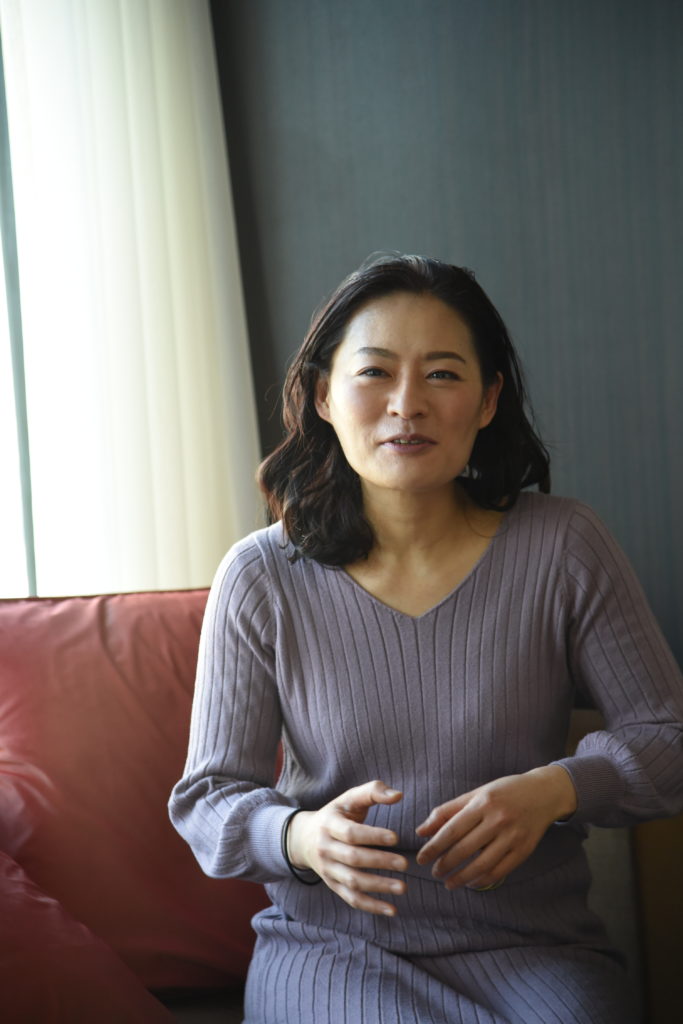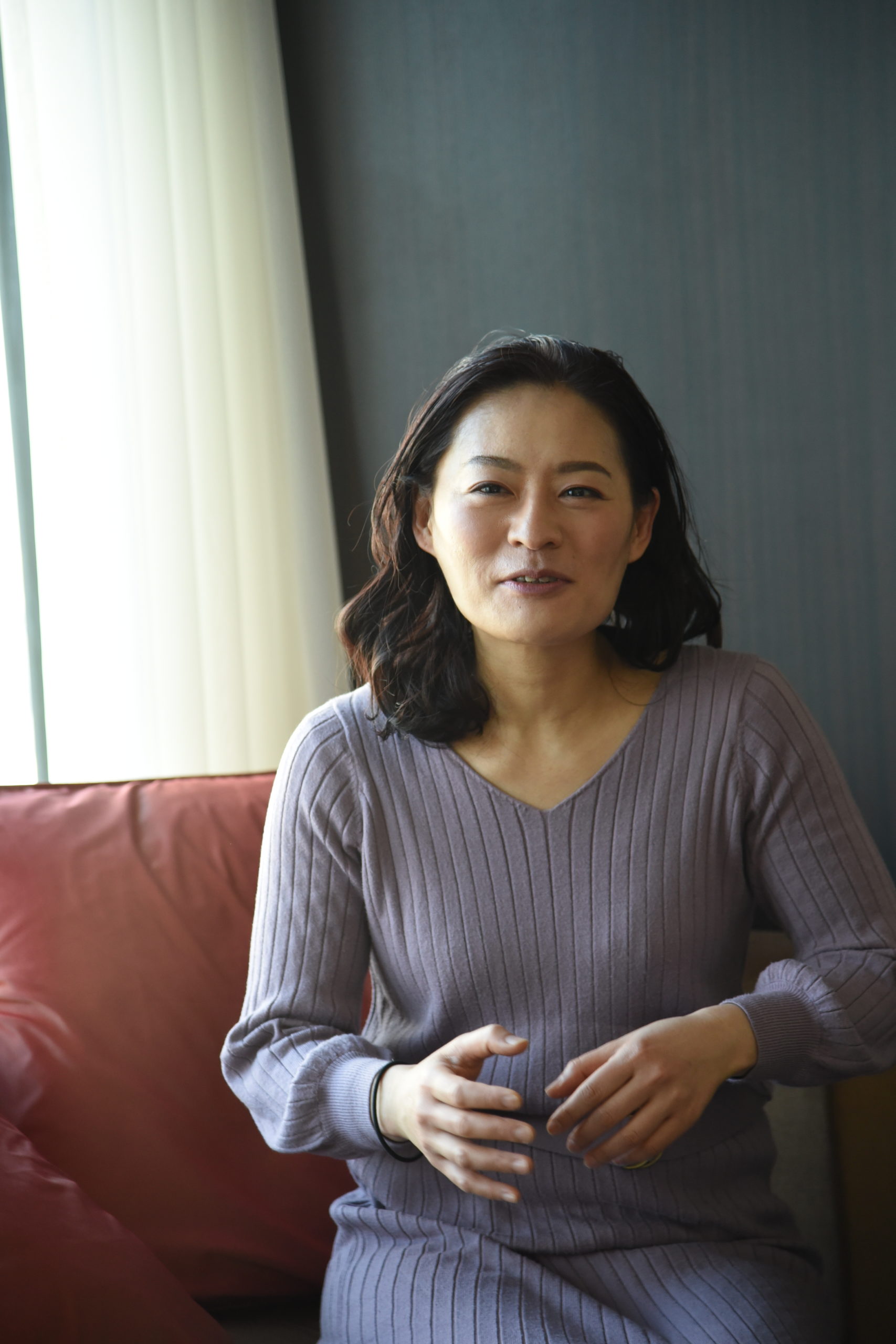By Kaori Shoji
UPDATE
“Intimate Stranger” will be screened with English subtitles at 6:50 pm on March 17, and at 4:15 pm on March 21 at Shibuya Eurospace. On March 21, there will be a post-screening talk with Jake Adelstein, the journalist and author of “Tokyo Vice.” https://www.cine.co.jp/shinmitunatanin/eng/
In Intimate Stranger a razor blade – the old fashioned kind that you see barbers wielding in movies, with an open blade that folds into a scabbard – makes a frequent appearance. So often in fact, that its significance shifts from symbolic to menacing, and the film starts to feel like a horror story. It’s pretty sharp, this blade, enough to slash open the face of a yakuza but with the right pressure, will leave a photogenic wound on a young man’s face. One of the questions that came up during the Q&A session after the screening of Intimate Stranger held at the FCCJ, was whether the writer/director Mayu Nakamura went around with a razor blade stashed in her bag. To which Nakamura replied breezily, in English: “I keep a razor blade in my heart.”

Photo by Satoko Kawasaki
Intimate Stranger is about a woman with a missing son, who connects with a 17-year old boy during a mask-clad, pandemic stricken winter in Tokyo. The woman works in a high-end shops that sells baby clothes, and at night she trawls the Net in search of a son who, in his photo that sits on her desk, looks incredibly unhappy. The teenager whom she takes under her wing (though the story reveals the circumstances are far less benevolent) is missing a family who cares about him. They strike up a relationship of sorts, each enabling the other to be what they want: a devoted mother, an adored and adoring son. Only the older woman is aware that this charade has a payoff.
The woman is Megumi, and she’s Nakamura’s creation as well as a bit of her altar ego. Megumi has no qualms about keeping a razor blade on her person: she uses it as much for self-defense as a source of sensual pleasure. An attractive, fiftyish woman played by veteran Asuka Kurosawa, Megumi is first seen as a lonely single mother looking for 17-year old Shimpei, who one day left their little home and never returned. The young scammer she befriends is Yuji (Fuji Kamio) who shows up to claim the reward cash promised for ‘any information’ about Shimpei.
Yuji is one of the runners for a phone scam operation but he’s not very good. His boss is abusive and violent and Yuji sticks around because he has nowhere else to go. When he meets Megumi, he cadges a cafe meal and 5000 yen in return for fabricated information. “I met your son in an Internet Cafe. We played some video games together, and then he left.” He’ll probably feed her enough lies to string her along, and at the right moment another runner will call her up, pretending to be Shimpei, and ask for money.
Megumi however, surprises Yuji by inviting him into her apartment “just until Shimpei comes home.” And Yuji can’t resist the prospect of home-cooked meals and a warm bed, plus a maternal figure who scolds him for throwing his dirty jockeys under the bed. She promptly picks them up, launders them, hangs them out to dry and irons them out.
Megumi is a great launderer as well as cook, cleaner and knitter of baby clothes. She revels in doing what other women may consider domestic drudgery, with a repressed, almost secret joy. This trait may be particular to Japanese women – they grow up expecting and expected, to spend their adult lives running a household, bearing and raising children and receding into a hard shell of domesticity. After years of doing that, a kind of demon may take up residence in her mind. “I feel like I’m in a pressure cooker,” says Megumi at one point. “The pressure mounts and mounts and one day, I snap.”
Sparse and minimal on the surface, Intimate…ispacked with a roiling, murky weirdness Nakamura feels is unique to Japan. In one scene, Megumi airs her views to Yuji: “Did you know that phone scamming happens only in Japan? Grown men calling up their mothers and grandmothers for money and expecting to get it…this would be unthinkable in the West. Why does this society pamper their males so much?” And Yuji, who earlier had scammed an old woman out of 200,000 yen by pretending to be her Covid-infected grandson, has no answer.
Intimate…is Nakamura’s second fiction feature, since 2006 when she made her debut with “The Summer of Stickleback.” Nakamura is not your ordinary Japanese filmmaker, meaning, she didn’t apprentice (read: slave labor) under an older, established male director or work in Japan’s tradition-entrenched, labor intensive studio system. Nakamura got her filmmaking experience and eye for frame composition in London, first as an undergrad at the University of London’s film society, and later in the graduate program of NYU film school. She made her first film at the age of 18, “on a Super 8” and 2 years prior to that, had quit high school in Tokyo to enroll in a London boarding school. “My father was a poet and my mother was a journalist,” Nakamura told me in a separate, private interview. “They never said ‘no’ to my plans. I’ve always been independent and competitive and I hate to lose.”
You could say Nakamura benefitted from this upbringing but she also made paid a hefty price to be the person she is today. Her parents were so wrapped up in work that they left their 6-year old daughter to live with her grandparents in Kyoto, where she subsequently spent the rest of her childhood. “Kyoto is heavily conservative. They don’t take kindly to outsiders and since I was from Tokyo and couldn’t speak the local dialect, I was bullied.” It was the kind of intense and destructive bullying designed to break her spirit – everyone in school ignored her totally and pretend she didn’t exist. “As a result, I became very strong,” laughed Nakamura adding that whatever hardships came her way, they couldn’t match what she suffered through in Kyoto.
As soon as she could, Nakamura got herself out of Japan and spent the next 14 years of her life abroad. She even got a green card in the US (“I won it in a lottery”) indicating that there could be a god out there who evens up past misfortunes with a destiny jackpot.
That god, in the scheme of Intimate Stranger, is definitely female. Nakamura, who had waited a decade to make Intimate…, says that after her years abroad, she was floored by many aspects of Japanese womanhood and felt the need to unleash her bewilderment and rage. “I had a very tough time getting funding. I was told by male investors that it was disgusting for an older woman to be in a semi-erotic relationship with a teenage boy. I am sure that they wouldn’t have said that if the genders were reversed. In Japan, women past 30 are no longer women, they’re expected to become mothers and morph into asexual beings.”
Megumi, for all her allure, clings to her identity as a mother. The apartment she shares with Yuji is a metaphor for her uterus, explained Nakamura, which account’s for the feeling of deep security, coupled with unbearable claustrophobia. They say that few people ever survive their mothers but my guess is that even fewer women survive the experience of being a mother.

Have to wonder if the writer was talking about some universal aspect of having been a mother in life is a permanent cage of some sort for a human propensity afterwards, yet, for Japanese mothers, the experience haunts her more so as such because of their incessant urge to serve their children or spouses plus their parents-in-law or their own parents as their response to social expectations real or imagined by they themselves. This was not so clear from the above, but the director’s life history was interesting, especially from the view point of how her experience abroad, especially in the western culture, outranked more oppressive values that made her suffer in her native society. A déjà vue type of stories not too uncommon to be heard these days but needs to be told in alignment with a production of the thoughts after all from readjustment with an outsider’s perspective? The plot sounds not unthinkable yet may still be fictional, idiosyncratic as a creative part of film making. Whether it can beat the complexities and diversity of the real world, even in the Japanese society, let us find out.
[…] Kaori Shoji on the Japan Subculture Research Center is the blog post “Intimate Strangers: Mothers Without Sons—new suspense film explores the depths of human connection“, and this post has made me all the more desperate to see this film. Not just for Kamino […]